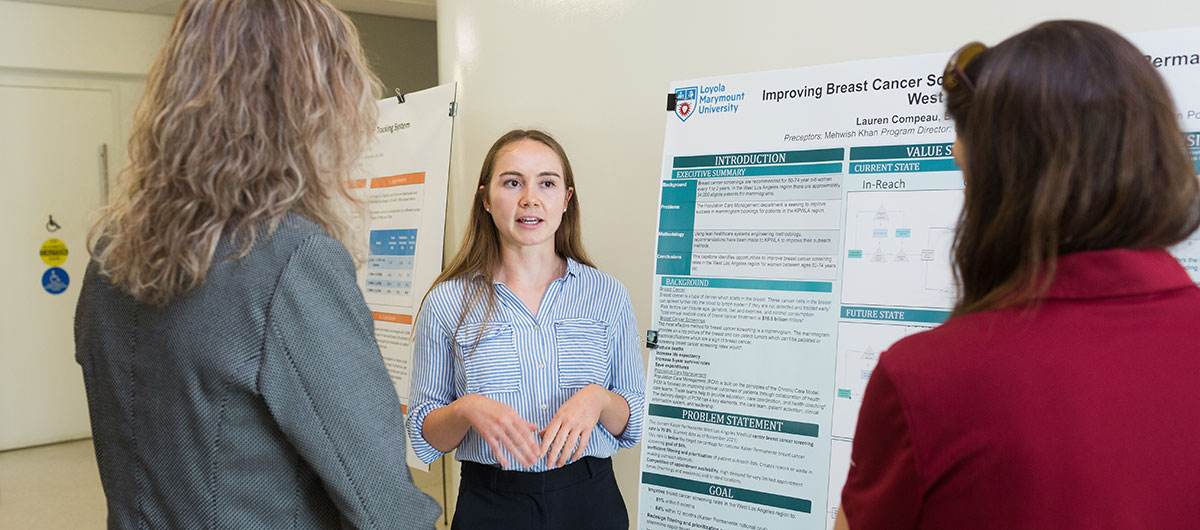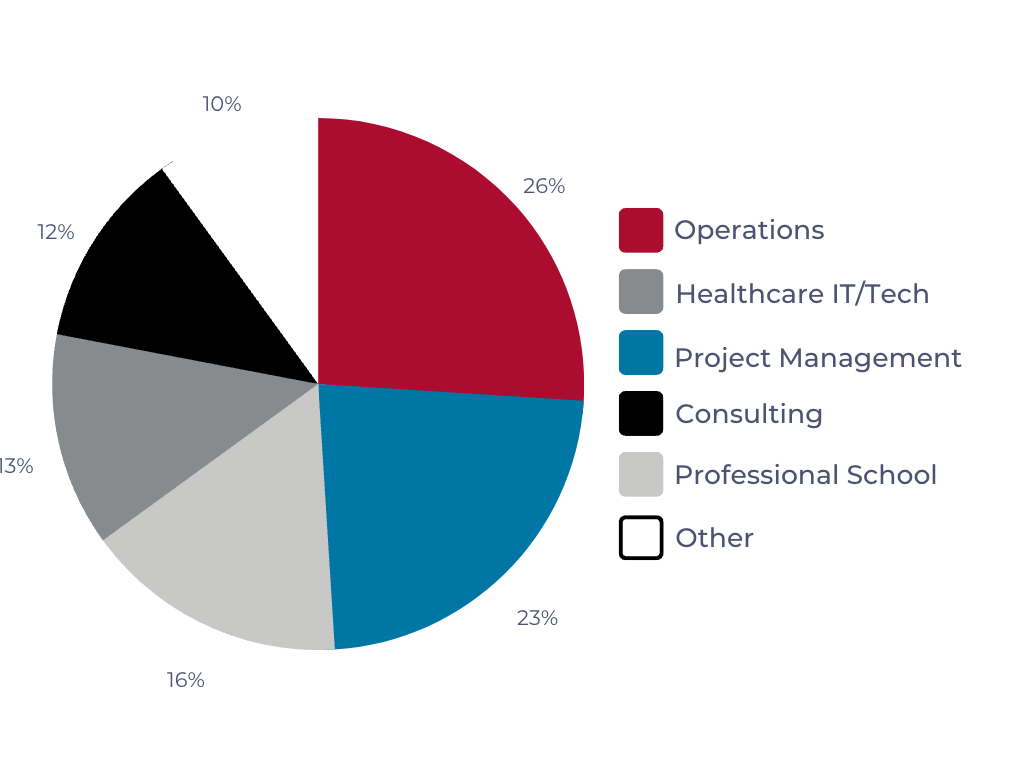
Master of Science in Healthcare Systems Engineering
The Healthcare Systems Engineering M.S. at LMU was one of the first of its kind in the nation. The program is designed to aid highly fragmented, dynamically evolving and highly complex multidisciplinary health care systems. It is mostly a non-mathematical body of knowledge, although some courses use statistics, modeling and simulations, and informatics.
Attend an Information SessionThe Need for Healthcare Systems Engineering

For the past decade, the U.S. Council of Advisors on Science and Technology have placed an emphasis on the importance of using systems engineering to solve complex challenges in health care, stating: "implementation bears the potential not only to improve the efficience of care delivery, but also improve its quality." Click here to explore our courses.
HSE provides systems-based solutions and helps manage projects that address industry problems in a broad range of areas:
- All clinical areas from virtual care to hospitals to pharmacies to labs to administration
- Integration of health care elements into patient-focused systems
- Collaboration between providers, patients, staff, IT, medical devices, processes, and payers
- Optimization of population health, telemedicine, and home care
- Electronic records and health care enterprise informatics
- Simulations and modeling of operations and economic analysis
- Optimization of medical transportation systems
- Equity and diversity in health care
- Big data analytics
Capstone Projects

Telemedicine and Remote
“Improving Enrollment and Utilization of Remote Glucose Monitoring at KPWLA”
by A. Say, 2023
More
Clinics
“Improving Long Term Follow-up for Bariatric Patients at a Safety Net Hospital”
by M. Williams, 2023
More
COVID Related Projects
“Strategies to Improve AltaMed’s Rate of COVID-19 Testing & Test Result Acquisition System”
by I. Aguilera, 2021
More
Hospitals
“Optimizing the Scheduling Process of Newly Diagnosed Patients Using Systems Engineering”
by Khosa, G., 2022
More
LMU Program Applies Engineering to Healthcare Systems
The comprehensive approach to health care systems is what makes Loyola Marymount University’s Health Care Systems Engineering (HSE) Program in the Frank R. Seaver College of Science and Engineering an innovative, and effective training program focused on impactful solutions that will advance health care for everyone.
Read MoreFrom the Director
“I'm excited to be on a new journey as the Director of the Master's degree program in Healthcare Systems Engineering at Loyola Marymount University. In our program, we use the tremendously powerful body of knowledge called Lean Healthcare Systems Engineering to improve processes and systems and reduce the unfortunate amount of fragmentation in the health care universe in the US. With their grounding in Lean, systems thinking, health care IT, quality, and a knowledge of all health care venues, our students are ready to hit the ground running and make an immediate difference.”
David Quam, M.D.

Why LMU?
-
The program maintains close relationships with top health care organizations, providing access to student visits, providing industry-relevant capstone projects to students and facilitating paths to jobs
-
HSE courses combine academic rigor with a practical focus through integration of patients, providers, staff, IT, devices, and processes
-
LMU is a pioneer in the field of Lean Systems Engineering, and offers a certificate program for those interested in advancement without an entire M.S. degree
-
Most faculty members have served in leadership positions at some of the highest-ranking health care institutions and aerospace engineering programs in the nation
-
A people-first curriculum designed with the help of national experts
-
Covers a broad range of areas in the field
-
Ideal for full-time students, nurses, and other health care industry professionals ready to move into leadership and administration positions
-
Follows LMU's mission to encourage learning, educate the whole person, the service of faith and the promotion of justice
-
University student to faculty ratio 11:1
-
Female students comprise 46% of the LMU student body
Student Testimonials

[Written during the pandemic] "Scary time right now! Right now more than ever the healthcare system is showing the evils of fragmentation and the need for HSE professionals…I think once this all settles, this is a great case study and could be a good demonstration of how powerful this degree program can be for our current healthcare system."
Stephen V. Speicher '10, M.S. '19, M.D., Senior Medical Director, Head of Healthcare Quality and Patient Safety, Flatiron Health
Read More TestimonialsGraduate Success

Our graduates have gone on to work in roles in leadership and management at prestigious organizationa on the forefront of the health care industry. With the potential to serve a 3-trillion dollar industry that boasts over 250,000 jobs in the Los Angeles area alone, our graduates are competitive in roles at companies including (but not limited to):
- Kaiser Permanente
- UCLA Health
- Cedars-Sinai
- Augmedix
- Huron Healthcare
- Cerner Corporation
- Flatiron Health
- Intermountain Health
- US Department of Veterans Affairs
- Baxter International
- Keck School of Medicine/USC
- Blackline Health
- Optum
- Prime Healthcare
How To Apply
Admission Requirements

- A completed online application and $50 nonrefundable application fee
- Bachelor's degree in science or engineering from a U.S. accredited university
- Minimum cumulative GPA of 3.0 recommended
- Essay demonstrating passion for health care
- 2 letters of recommendation
Fast Track Options

Eager To Enter The Workforce? Check out LMU’s fast-track degree options, where you can earn your graduate degree quickly and start making strides in your field.
Three-Course Graduate Certificate (Non-Degree Option)